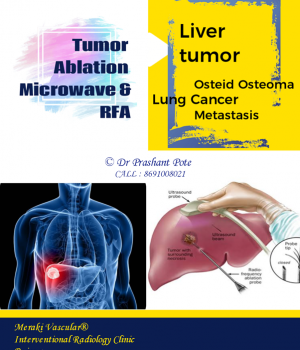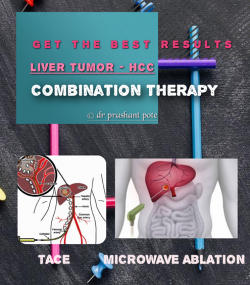Microwave Ablation (MWA) / Radiofrequency Ablation (RFA) of Tumors
Most commonly used for as treatment modality for selected cases of:
- Liver cancers (HCC intermediate stage & Intrahepatic cholangiocarcinoma)
- Lung malignant nodule / metastasis
- Painful bone metastasis
- Osteiod osteoma- small benign bone tumor which are very painful
- Fibroid

How does it works?
Microwave ablation is an extremely promising heat-based thermal ablation modality that has particular applicability in treating hepatic malignancies. Microwaves can generate very high temperatures in very short time periods, potentially leading to improved treatment efficiency and larger ablation zones.

Who is the candidate for ablation therapy?
Ablation is a viable and effective treatment option if you:
- are not a good candidate for surgery because your tumor is difficult to reach.
- have other medical conditions that make surgery especially risky.
- would not have enough liver tissue left for the organ to function adequately following the surgical removal of a tumor.
- have liver tumors that have not responded to chemotherapyor that have recurred after being removed surgically.
Image-guided, minimally invasive procedures such as ablation are most often performed by a specially trained interventional radiologist in an interventional radiology suite or occasionally in the operating room.
Once the needle electrode is in place, radiofrequency/ microwave energy is applied. For a large tumor, it may be necessary to do multiple ablations by repositioning the needle electrode or by placing multiple needles into different parts of the tumor to ensure no tumor tissue is left behind.
What are the benefits of Microwave/ RFA ablation?
- Radiofrequency and microwave ablation can be an effective treatment for primary liver cancer and for cancers that have spread to the liver in select patients whose liver tumors are unsuitable for surgical resection.
- In most studies, more than half of the liver tumors treated by ablation have not recurred. The success rate for completely eliminating small liver tumors is greater than 85 percent.
- Treatment-related serious complications are infrequent and discomfort is less than surgery.
- Ablation may be used repeatedly to treat recurrent liver tumors.
- The percutaneous method of ablation, in which needles are inserted through the skin, is minimally invasive, produces few complications, and does not require hospital admission.
- Ablation is a relatively quick procedure and recovery is rapid so that chemotherapy may be resumed almost immediately in patients who need it.
- No surgical incision is necessary—only a small nick in the skin that does not need stitches.
- If you have been diagnosed with liver cancer, ask your physician/ surgeon can tumor ablation be a viable and effective treatment option for you. Dr Prashant Pote encourages patient to get in contact with him in OPD to discuss the best possible solution.
- Dr Prashant Pote, specialist in liver tumor embolization (TACE & TARE) and tumor ablation along with his clinical team at our vascular center combine medical expertise and compassion to guide you through your cancer treatment journey, providing better quality of life to liver cancer patient.
